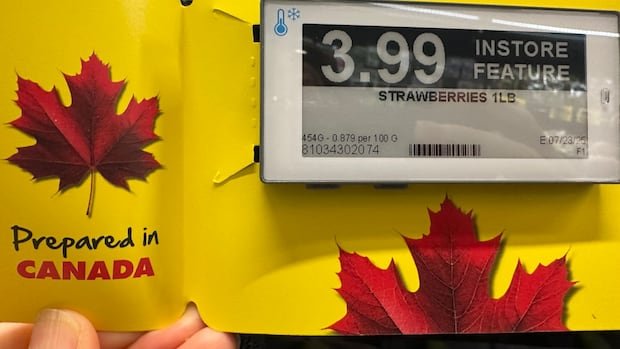Stacey Dineen, residing near Kitchener, Ontario, is a staunch supporter of buying Canadian products, influenced by concerns sparked by President Trump’s remarks about annexing Canada. Dineen prioritizes Canadian food purchases but opts for non-U.S. imports when Canadian options are unavailable. Major Canadian grocery chains have embraced this trend, promoting patriotism through advertisements and commitments to facilitate Canadian product purchases.
However, Dineen has encountered frustration due to inconsistent information provided by grocers regarding product origins. Instances like finding organic broccoli labeled as a “Product of Canada” but bearing a “Produce of USA” tag have left her feeling misled and exasperated. Recent findings from the Canadian Food Inspection Agency (CFIA) and a CBC News investigation highlight the persistent issue of mislabeling product origins by retailers, which contravenes regulations mandating accurate and non-misleading in-store food signage.
According to CFIA data, from November 2024 to mid-July, 97 complaints related to country-of-origin claims were lodged, with 29 cases (32%) found to be in violation of labeling rules. Most discrepancies involved bulk produce, promptly rectified by the companies. Visits to various grocery stores in downtown Toronto revealed similar inconsistencies in country-of-origin information for both bulk and prepackaged produce, extending to a variety of other products like almonds and berries.
Experts like Mike von Massow and Mary L’Abbé emphasize the importance of retailers interpreting regulations accurately and ensuring transparent labeling practices. They urge grocers to address issues promptly to maintain consumer trust. Grocers like Sobeys, Loblaws, and Metro have acknowledged the challenges in maintaining accurate country-of-origin signage due to evolving inventory but have pledged to reinforce policies and minimize errors in response to the scrutiny.
In light of the Buy Canadian movement, retailers have adorned domestic products with maple leaf symbols, signifying Canadian origin. However, instances of imported items wrongly marked with such symbols have created confusion among consumers. It is crucial for stores to ensure transparency in labeling practices to avoid misleading consumers and eroding trust.
Consumers encountering misleading food advertising or labeling are encouraged to report such instances to the CFIA for investigation. Retailers are urged to uphold transparency and accuracy in their product labeling to uphold consumer trust and confidence in the Buy Canadian movement.


